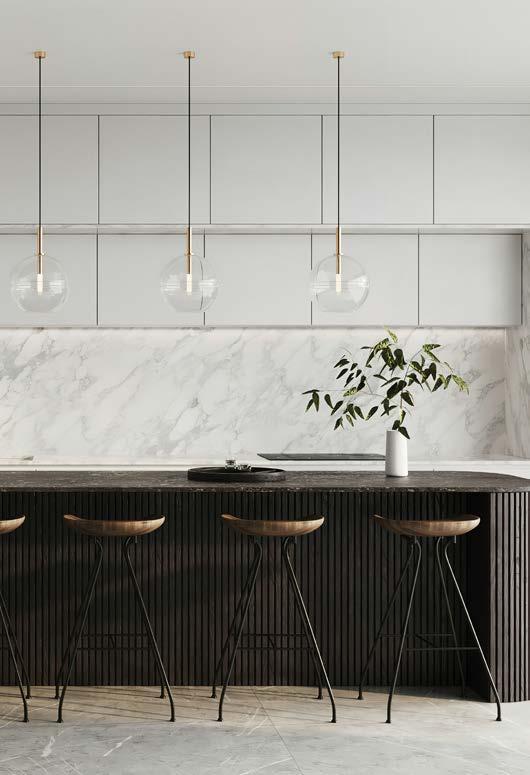

WELCOME TO THE August 2024
P u BLI s HER
Century 21 Australia Pty Ltd
CON t RIB ut OR s
Chris Gray CoreLogic REI Super
EDI t ORIAL ENQ u IRIE s
Century 21 Australia (02) 8295 0600
ADVER t I s IN g ENQ u IRIE s
Century 21 Australia (02) 8295 0600
DI s CLAIMER
We have in preparing this information used our best endeavours to ensure that the information contained therein is true and accurate, but accept no responsibility and disclaim all liability in respect of any errors, inaccuracies or misstatements contained herein. Prospective buyers and sellers should make their own enquiries to verify the information contained herein. All information contained in the CENTURY 21 Australia Pty Ltd website is provided as a convenience to clients. All links to property prices displayed on the website are current at the time of issue, but may change at any time and are subject to availability.
For more information on our Privacy Policy please refer to: www.century21.com.au/privacy

C O u LD t HE
CHEAPE st FEE
BE t HE MO st EXPEN s IVE?

BY CHRIS GRAY, CEO, YOUR EMPIRE
Our parents’ generation believed in getting rich by saving money. Phrases like “look after the pennies and the pounds will look after themselves” and “why pay someone else to do something when you can do it yourself” were common wisdom. However, times have changed, and a more contrarian way of thinking has emerged.
The standard fee for most real estate agents to sell or buy residential property across Australia is 2% plus GST. In rural and remote areas, this can vary. Some agents might discount their fees to 1.5%, 1%, or even as low as 0.75%. On a $1 million sale or purchase, this could mean paying anywhere from $7,500 to $20,000 plus GST –a significant difference.
THE TRUE COST OF DISCOUNT AgENTS
Is choosing a discount agent really saving you money, or is there more to the decision?
When you pay a sales agent a percentage of the property sale, it’s easy to assume they are incentivised to get you more. But is that really true?
• Sales Agent A charges 2% and works hard to sell your property. If they sell it for $1 million, they make $20,000. If they sell it for $1.1 million, they make $22,000.
• Sales Agent B charges 1%. If they
sell it for $1 million, they make $10,000. If they sell it for $1.1 million, they make $11,000.
Do you think Sales Agent B will work as hard to get you an extra $100,000 on your sales price, or will they prefer to quickly close the deal for $1 million and move on to the next sale? They need to sell twice as many properties as Sales Agent A to earn the same amount at the end of the month.
Assuming Sales Agent A does work harder and sells the property for $1.1 million, you would receive $1,078,000 after fees. If Sales Agent B sells it quickly for $1 million, you would receive $990,000 after fees. You’ve paid an extra $12,000 in fees but made an extra $100,000 on the sale, netting you $88,000 more.
THE BUYER’S AgENT SCENARIO
The situation is similar for buyer’s agents.
• Buyer’s Agent A works hard to find an off-market property for
$1 million and charges the client $20,000, meaning the client pays $1.02 million.
• Buyer’s Agent B charges half the amount and needs to find a property quickly to handle double the transactions. They might buy the property with little research, no relationship with the selling agent, and go to auction, paying $1.1 million. The client ends up paying $1.111 million, saving $9,000 in fees but spending $91,000 more overall.
Often, the buyer might not realise they’ve overpaid because the agent could justify the purchase by claiming it was market price. They might even show comparable properties (that aren’t actually really comparable) priced higher to make it seem like a good deal.
WHY MIgHT A BUYER’S AgENT CHAR gE LESS?
• Lack of experience
• Desperation to get clients and pay bills
• Inability to offer strategic advice

• Lack of differentiation from competitors
• Few testimonials or credibility
• Competing solely on price
IS PAYINg MORE A gUARANTEE OF BETTER RESULTS?
No, paying the standard 2% fee doesn’t guarantee you’ll get a great agent and a fantastic result. You still need to vet the agent by asking critical questions and assessing their responses. Some agents might excel in marketing and social media but lack the substance to deliver results.
ESSENTIAL QUESTIONS TO ASK AN AgENT
• How many years of experience do you have in buying property?
• Do you have professional qualifications that guide your investment strategy?
• What financial results have you achieved personally?
• What properties do you buy for yourself and why?
• Where do you get your strategy and information?
• Can we talk to your previous clients?
Sometimes, buying something cheap can be a good decision. But when it comes to your home – your most valuable asset – or building an investment portfolio that will be your family’s life savings and future retirement plan, hiring the best agent is crucial. Do you want to risk everything with the cheapest salesperson, or do you think an experienced advisor is more appropriate? The choice is yours.
At Your Empire, our commitment to securing independent bank valuations
before any purchase ensures that clients pay a conservative and fair price, safeguarding your investment and future.

ABOUT THE CONTRIBUTOR
Chris Gray is CEO of Your Empire, a buyers’ agency that buys homes and investments for time –poor professionals – searching, negotiating, renovating and managing property on their behalf. Chris has spent over 10 years as the host of ‘Your Property Empire’ on Sky News Business channel, where he’s interviewed various heads of property research companies and major industry figures. Chris is a qualified accountant, buyers’ agent and mortgage broker. For more information, visit www.yourempire.com.au and follow Chris on Facebook: @ChrisGraySydney

tHREE CAPItAL CItIEs RECORD A FALL IN HOME VALuEs As MOMENtuM LEAVEs tHE CYCLE

BY CORELOGIC
While headline growth rate remains positive, three capitals recorded a decline in values over the past three months with Melbourne falling -0.9%
National home values rose 0.5% in July, the 18th consecutive monthly increase in home values nationally – a figure on par with the 0.5% increase recorded in June. Following a -7.5% decline recorded between May 22 and Jan 23, the national HVI has gained 13.5% and values have consistently pushed to new record highs since November last year.
However, while the headline growth rate remains positive, it is clear momentum is leaving the cycle and conditions are becoming more diverse. Three capitals recorded a decline in values over the past three months. Melbourne led the decline with a -0.9% fall, alongside a -0.8% and -0.3% reduction in Hobart and Darwin values respectively.
The rolling quarterly pace of growth has slowed markedly in Sydney to 1.1%, a fraction of the 5.0% quarterly gain recorded at the same time last year. These dynamics are weighing on growth in national home values,
which are up 1.7% in the past three months compared to the 3.2% increase seen this time last year.
The mid –sized capitals are continuing to buck the slowing trend, with the quarterly pace of growth in Perth tracking at 6.2%, while growth in Adelaide accelerated to 5.0%, the fastest rolling quarterly pace of growth since May 2022. Brisbane values rose at a quarterly pace of 3.8%, though this is down from a 4.7% increase seen this time last year.
CoreLogic’s research director, Tim Lawless, said available supply is a key factor explaining the diverse outcomes in housing growth trends.
“The number of homes for sale in Brisbane, Adelaide and Perth is more than 30% below average for this time of the year, while weaker markets like Melbourne and Hobart are recording advertised supply well above average levels,” Mr Lawless noted.
An erosion in borrowing capacity and affordability factors is skewing demand towards the lower price points of the market, with lower quartile values leading the growth trend across every capital city except Darwin and Canberra which are also the two most affordable capitals after adjusting for local incomes. At a combined capital city level, lower quartile dwelling values are up 3.3% over the past three months compared with a 0.8% increase in upper quartile values.
Growth in regional housing values is once again lagging the capitals, with a rolling quarterly rise of 1.3% across the combined regionals index compared with a 1.8% gain across the combined capitals. Mimicking the capitals growth pattern, regional Western Australia (4.7%), regional South Australia (3.2%) and regional Queensland (2.8%) led the rolling
Continued over page
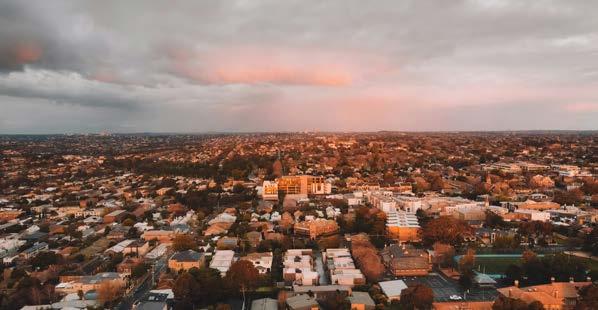
Continued from previous
quarterly change. Regional Victoria was the only ‘rest of state’ area to record a decline in values over the three months ending July, with values falling -1.4%.
Units are now rising faster than houses across most of the capitals. The only exceptions over the past three months were Darwin and the ACT, where affordability pressures are less pressing and a history of higher supply levels across the medium to high density sector has been more apparent.
“MOST CITIES NOW HAVE A MEDIAN HOUSE VALUE THAT IS AT LEAST 1.5 TIMES HIGHER THAN THE MEDIAN UNIT VALUE. WITH STRETCHED HOUSING AFFORDABILITY, LOWER BORROWING CAPACITY AND A LIFT IN BOTH INVESTOR AND FIRST HOME BUYER ACTIVITY, IT’S NOT SURPRISING TO SEE THE UNIT SECTOR OUTPERFORMING FOR A CHANGE,” MR LAWLESS SAID.

CoreLogic’s hedonic rental index was only 0.1% higher in July, the smallest monthly rise since August 2020. The monthly change in rents was negative in Sydney and Brisbane (-0.1% in both cities and the first monthly decline since 2020) as well as Hobart (-0.3%).
A clear slowdown in the pace of rental growth across the unit sector has been the main drag on rental growth, especially in Sydney where the annual change in unit rents has dropped from 17.9% in May last year to 6.6%. Melbourne and Brisbane unit rents have also lost more than 8 percentage points in the annual growth rate.
The slowdown in unit sector rental growth is off a high base. Despite the slower rate of annual growth, Sydney unit rents still rose by 6.6% over the past 12 months, which is more than double the pre–COVID decade average (2.7% annual growth).
“The easing in rental growth aligns with the peak in net overseas migration in the first quarter of 2023. The large majority of overseas migrants, mostly students,
arrive in Australia on temporary visas. Housing demand from overseas migration tends to favour inner city unit rental markets,” Mr Lawless said.
Growth in house rents is also easing in most cities, but again this is from a high base with the annual pace of rental growth remaining well above pre–COVID averages in most cities.
With value growth outpacing rental growth we could once again see some downwards pressure on gross rental yields. The spread between investor mortgage rates and gross rental yields has widened significantly since the commencement of the rate hiking cycle: in April 2022 there was only 1 basis point difference between national gross rental yields and variable mortgage rate for investors. Since then the spread has widened to 294 basis points in July, implying opportunities for positive cash flow have become increasingly scarce.
Click here to read the full article




H OW tO BOO st
YO u R PROPER t Y’ s st REE t APPEAL
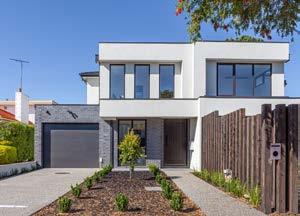
It is often said that it’s “what’s on the inside that counts” but when it comes to selling your home the exterior appearance can play a crucial role. First impressions are powerful and enhancing the home’s street appeal can make a significant impact on potential buyers and the final sale price. Street appeal is the immediate visual attraction of a home from the footpath, and it’s essential for drawing in buyers when they view the home for the first time, encouraging them to explore further.
Achieving better street appeal doesn’t require a massive budget or extensive renovations either. There are some simple and relatively affordable updates that can make a major difference. Here are 10 expert tips to transform your home’s exterior from lacklustre to impressive!
1. REFRESH YOUR FACADE
A clean and well maintained exterior suggests a well–cared for home inside. If the front of your home is looking worn and outdated, a fresh coat of paint can make a dramatic impact and rejuvenate its appearance. Dated finishes, cracked siding and peeling paint can diminish your home's value. Remember to use paint that is suitable for exterior use!
2. REVAMP THE FRONT DOOR
The front door is a focal point and sets the tone for the entire house.
A new colour or replacement door can drastically alter its appearance. Choose a bold colour for a contemporary look or a more classic shade to complement a traditional facade. Appealing doors can often lead to a better sales outcome with more interest and better competition between buyers.
3. UP gRADE YOUR HARDWARE
Once you’ve painted your front door, don’t forget to update its hardware. New handles, mailboxes and house numbers can add a touch of sophistication. Buyers are often subconsciously influenced by the overall sensory experience. This is a budget friendly way to enhance curb appeal and matching elements can make your home appear more polished and cohesive.
4. CLEAR THE CLUTTER
A messy front verandah or garden can make your home look neglected
and create a sense of chaos in the potential buyer’s mind. Removing clutter is an easy way to instantly improve its appearance and create a welcoming atmosphere. A buyer will be able to better visualise themselves in that house.
5. CLEAN THE WINDOWS
As simple as it may sound, dirty and cobweb–covered windows can detract from your home’s appeal.
A thorough cleaning, along with repainting worn–out frames and removing old curtains, can make your home look more inviting. This also allows more natural light to enter and make the home bright and airy.
6. DO A SPRINg CLEAN
Regardless of the season, a thorough cleaning can enhance street appeal. Power washing,
Continued over page
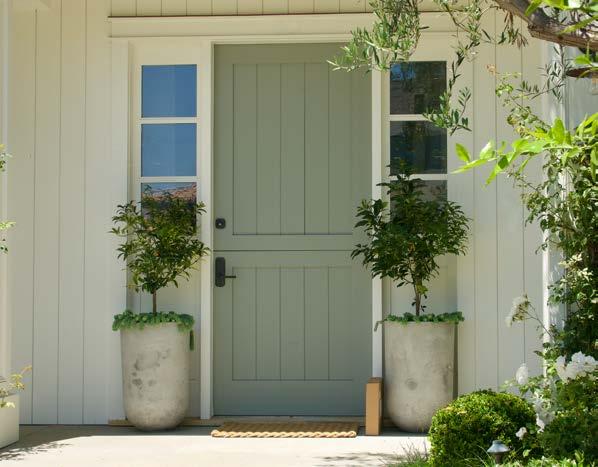
Continued from previous
tidying up and trimming overgrown areas can make a big difference. Pulling weeds and trimming hedges shows that you have maintained the property and land well.
7. BEAUTIFY YOUR LAWN
An overgrown or neglected front yard can give a poor impression. Regular maintenance, including mowing and fertilising is crucial. A well maintained lawn significantly enhances street appeal and you can consider adding landscaping borders for a neat look. If grass doesn’t thrive in your area you can use high quality artificial turf as a low–maintenance alternative.
8. ADD POTTED PLANTS
Even if you lack a front yard, potted plants or window boxes can add charm to your home’s exterior. Neat planters and well–chosen plants bring life and character to the facade. Plants are excellent for boosting positive energy and adding colour. They symbolise growth and renewal which are appealing to buyers.
9.
UPDATE YOUR LIgHTINg
Elegant outd oor lighting can highlight your home’s best features and improve both security and ambiance. Proper lighting enhances the beauty and functionality of outdoor space. Consider adding path lights, floodlights or spotlights
to accentuate your home’s features. LED or solar –powered lights are energy –efficient options.
10. ENHANCE YOUR PATHS
If your pathways are stained or cracked, addressing this can improve street appeal. Pressure washing or covering paths with gravel can provide a quick fix. Maintaining pathways by replacing broken paver’s or upgrading to higher quality materials can add a touch of sophistication and appeal to buyers. By implementing these straightforward and cost–effective improvements, you can significantly enhance your home’s street appeal and attract potential buyers more effectively.
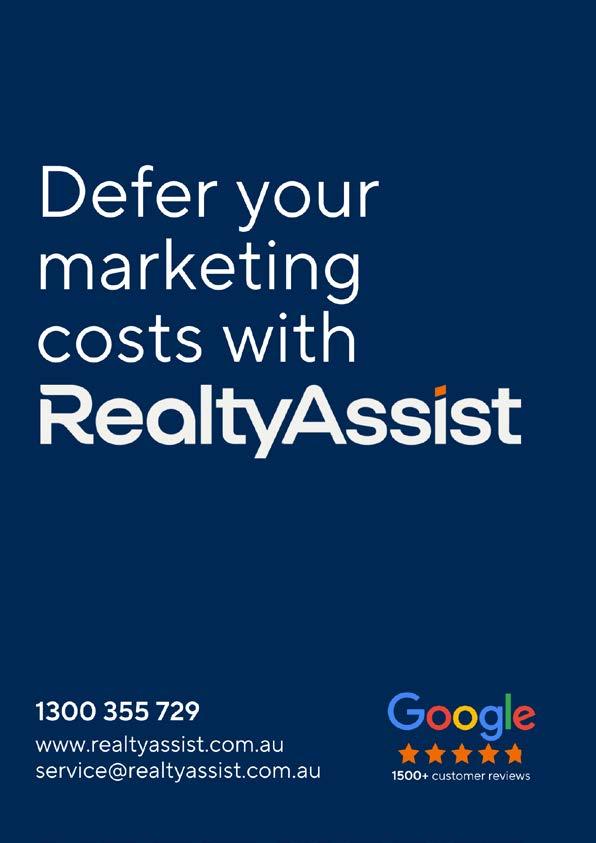
D ON’ t LE t
YO u R HEALt H AFFEC t YO u R RE t IREMEN t PLAN s

BY REI SUPER
Retirement – a chapter in life where aspirations take centre stage, and health becomes a critical factor. Recent studies indicate that 83% of Australians harbour concerns about the potential impact of serious illnesses on their well-being in retirement 1. This substantial figure calls us to explore the intrinsic link between health and fulfilment in the context of retirement.
THE RETIREMENT HEALTH DILEMMA
According to a study by MetLife1 , nearly four in five Australians are concerned that health issues could disrupt their retirement plans, emphasising the pivotal role that health plays in the pursuit of a fulfilling retirement. Let's delve into the solutions and strategies that empower individuals to navigate their retirement years with confidence.
CATALYSTS FOR WELLNESS
In our commitment to ensuring your retirement is as healthy as it is fulfilling, we've collaborated with MetLife to introduce 360Health – a comprehensive platform connecting you with global medical specialists, dedicated general practitioners, empathetic mental health clinicians, and a select group of allied health professionals. The significance of this collaboration becomes evident when considering the broader health landscape in Australia.
AUSTRALIAN INSIgHTS: A NATIONAL HEALTH OVERVIEW
Insights from MetLife's Customer Perceptions of and Attitudes to Australian Life Insurance Study, October 2022 align with a broader perspective within the Australian population. Chronic conditions, including heart disease, diabetes, and mental health issues, impact a significant portion of Australians 2 Addressing these shared health challenges collectively is pivotal to fostering a healthier society.
360HEALTH IN ACTION: A PRACTICAL APPROACH
360Health is more than a health program – it's a practical tool empowering individuals to manage health concerns effectively.
Beyond the worry of potential health challenges in retirement, it serves as a conduit to connect with professionals, stay proactive in maintaining well-being, and navigate the post–work phase with resilience.
A HEALTHIER, MORE SECURE RETIREMENT
Retirement should be a phase marked by good health, achievable aspirations, and a robust support system. With MetLife and 360Health as invaluable resources, individuals can actively shape a retirement that prioritises health, resilience, and fulfilment.
How do I access 360Health?
Visit MetLife 360Health 360Health | MetLife Australia
The information provided is general information only and is not health or medical advice. If you have a health or medical concern, please seek professional medical advice immediately. 360Health services are provided by a third party, Teladoc Health Pty Limited.
Click here to learn more









YourPorter specialises in connecting household utilities ensuring your moving experience is made easy. Freedom – stay in total control, making choices to suit your needs be it cost, product features or supplier preference Our service comes at no cost and no obligation to you Simple – use our easy, online signup process or speak to one of our friendly consultants on the phone.
Once
